|
|
|
Sort Order |
|
|
|
Items / Page
|
|
|
|
|
|
|
| Srl | Item |
| 1 |
ID:
176210
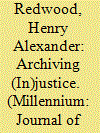

|
|
|
|
|
| Summary/Abstract |
This article explores the role that archives play in the constitution and governance of the international community. First, drawing on post-colonial scholarship, it develops a framework to explicate the link between archive and community, centring on questions of voice, identity and responsibility. It then examines how the archive can be analysed, pointing additionally to the importance of the archive’s materiality. Second, these ideas are explored through a reading of the International Criminal Tribunal for Rwanda’s (ICTR) archive, which helped rebuild the international community in the wake of its failure to prevent the Rwandan genocide. By providing a detailed reading of the ICTR’s records, and drawing on the framework established in the first section, the article shows that the archive constructed a liberal, patriarchal and colonial understanding of the international community.
|
|
|
|
|
|
|
|
|
|
|
|
|
|
|
|
| 2 |
ID:
181816
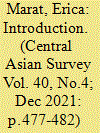

|
|
|
|
|
| Summary/Abstract |
In the last 30 years since the advent of independence, the field of Central Asian studies has become more diverse and new generations of scholars have emerged. This issue assembles seven articles by 10 authors who represent the field at large. In addition to embracing the growing field, the authors critique what they view as remaining misinterpretations or omissions in their respective disciplines. Exciting innovations for understanding Central Asia continue to flourish from the region as well as in collaboration with international partners. The coming decade is a turning point for the Central Asian studies – a time to host spirited debates and explore experimental approaches, new theories and topics.
|
|
|
|
|
|
|
|
|
|
|
|
|
|
|
|
| 3 |
ID:
175481
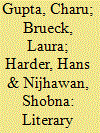

|
|
|
|
|
| Summary/Abstract |
This collection brings together nine essays, accompanied by nine short translations, that redraw the boundaries of literary histories both temporally and spatially. The essays, rooted in the humanities and informed by interdisciplinary area studies, explore multiple linkages between forms of print culture, linguistic identities and diverse vernacular literary spaces in colonial and post-colonial South Asia. The essays and translations foreground complex and politicised expressions of gender and genre in fictional and non-fictional print materials and thus draw meaningful connections between the vernacular and literature, the everyday and the marginals, and gender and sentiment. Collectively, they expand vernacular literary archives, canons and genealogies, and push us to theorise the nature of writing in South Asia.
|
|
|
|
|
|
|
|
|
|
|
|
|
|
|
|
| 4 |
ID:
165930
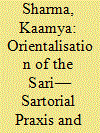

|
|
|
|
|
| Summary/Abstract |
This article analyses the homologies between colonial knowledge projects and post-colonial revival programmes through Indian textiles and dress. In the nineteenth century, the colonial bureaucracy treated Indian textiles as samples of ‘native’ artisanship, using them to police discourses of race, gender and citizenship. Concomitantly, the nationalist movement created a model of Indian womanhood that conscripted women to be both ‘traditional’ and ‘modern’, signified in the Nivi sari, linking this to emerging craft conservation movements. Post-Independence, elite women became the directors of craft revival by linking sartorial taste to ideal womanhood in a continuation of colonial discourse.
|
|
|
|
|
|
|
|
|
|
|
|
|
|
|
|
| 5 |
ID:
145457
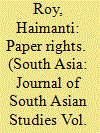

|
|
|
|
|
| Summary/Abstract |
This essay contextualises the emergence of a document regime which regulated routine travel through the deployment of the India–Pakistan Passport and Visa Scheme in 1952. It suggests that such travel documents were useful for the new Indian state to delineate citizenship and the nationality of migrants and individual travellers from Pakistan. The bureaucratic and legal mediations under the Scheme helped the Indian state to frame itself before its new citizens as the sole certifier of some of their rights as Indians. In contrast, applicants for these documents viewed them as utilitarian, meant to facilitate their travel across the new borders. The contrast and contestation between such different perceptions helps us to understand the continued significance of documentary identities in contemporary India.
|
|
|
|
|
|
|
|
|
|
|
|
|
|
|
|
| 6 |
ID:
193230
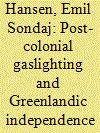

|
|
|
|
|
| Summary/Abstract |
This article proposes the concept of ‘post-colonial gaslighting’ to analyse subtle forms of colonialism and domination in international relations and the persistence of hierarchies in the international system. It asks why Greenland, despite electoral majorities for independence, remains a part of the Kingdom of Denmark. Going beyond existing materialist explanations focusing on lack of economic development, the article deploys the framework of ontological insecurity to show how Danish elites through techniques of gaslighting challenge the post-colonial status of Greenland and prevent agency. The Greenlandic colonial experience is rejected and delegitimised, in turn providing the foundation for blaming Greenlanders for failing to live up to the criteria of statehood. The article thus breaks with widespread assumptions of voluntarism in the literature on non-sovereignty, as well as introducing mechanisms of contestation to the literature on ontological security. The theoretical contribution of the article is the conceptual marriage of the hierarchy and ontological security literatures through the concept of post-colonial gaslighting.
|
|
|
|
|
|
|
|
|
|
|
|
|
|
|
|
| 7 |
ID:
174421
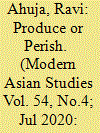

|
|
|
|
|
| Summary/Abstract |
This article argues that the late 1940s in India should no longer be reduced to the twin events of partition and independence. A generalized political crisis unsettled, for a brief period, the structures of social and economic power, and not just intercommunity relations and the constitution of the state. These years were thus, among other things, a catalytic moment for the definition of ‘labour’ as both a political category and a parameter of post-colonial politics: processes dating back to the First World War, at least, were consolidated, under pressure from this crisis, into a new labour regime that has withstood political pressure for almost seven decades. The article offers an analysis of the almost-forgotten post-war strike movement, which was nevertheless unprecedented in its social and geographical spread. The movement elicited both repressive and reformist responses: the extraordinary level of emergency powers applied to suppress it are, therefore, as much examined as the series of momentous legislative and institutional changes of the late 1940s. In conclusion, the long-term consequences of this cycle of strike–reform–repression for India's post-colonial labour regime are adumbrated. A strongly etatist, potentially authoritarian, regime of industrial relations, it is argued, was checked by an enduring political trade union pluralism. At the same time, divisions within India's working classes were deepened and consolidated as labour law and social legislation sealed off the comparatively small ‘core workforces’ of public sector and large-scale industrial enterprises from the majority of workers in what would soon be called the ‘informal economy’.
|
|
|
|
|
|
|
|
|
|
|
|
|
|
|
|
| 8 |
ID:
145268
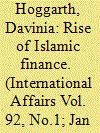

|
|
|
|
|
| Summary/Abstract |
Islamic finance signifies more than a projection of religious affiliation. The importance of Islamic finance is increasing in central Asia, both as a source of capital and as a form of post-colonial market-building. In central Asia, it is an important facet of the new phenomena of ‘nation-branding’ and a means of reinvigorating the economy. In identity politics, Islamic finance projects an attitude of religious tolerance allowing states in the region to reposition their geopolitical identity relative to the Islamic community. This creates a ‘performance’ of Islamic finance that facilitates the creation of legitimacy for the state. Adopting Islamic finance projects images of the state's religious tolerance and diversity without changing the underlying structures; it suggests an ‘Islamicness’ that is useful to the development and post-colonial goals of the state. As such, it creates opportunities for geopolitical alliances with Muslim countries. Economically, it appeals to rising financial-industrial elites seeking new investment-opportunities, which reduces pressure on the state to democratize. Meanwhile, in Russia, Islamic finance is an alternative source of capital for the sanctions-hit state and a useful identity marker with which to connect to the increasingly wary Caucuses and Commonwealth of Independent States countries, lending it a wider significance across Eurasia.
|
|
|
|
|
|
|
|
|
|
|
|
|
|
|
|
|
|
|
|
|